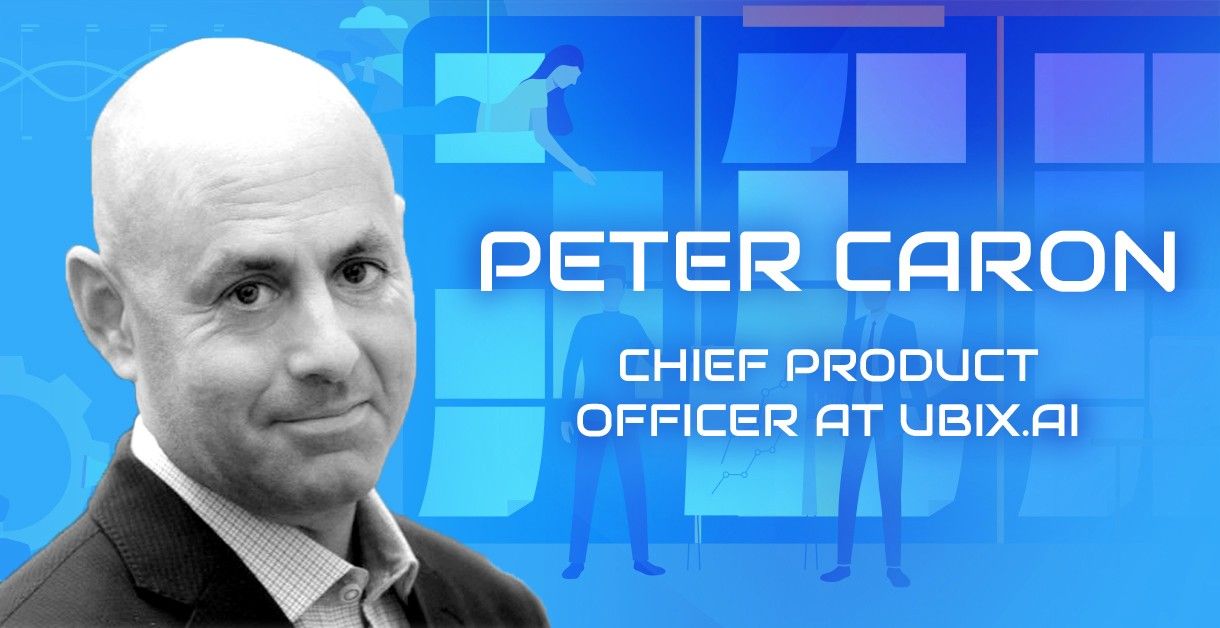Peter Caron, Chief Product Officer at UBIX.AI, was one of the participating panelists in our July TechDebate discussing the challenges and merits of agile development. Peter has spent his career in product management, and much of this experience has been working on data science-driven products. I had the opportunity to talk with him further to learn more about his perspectives on agile, successful product and project management, and ways to keep stakeholders moving in the same direction. To attend future debates, register at www.techdebate.org. We’re always on the lookout for debaters—if you have something to say, let us know: https://techdebates.sphereinc.com/debater-registration.
Could you tell me a little bit about UBIX.AI?
PETER: I had my first experience managing a data science product 20 years ago. When I look back, I realize that we were tackling machine learning before it was really a movement. Of course, much has advanced in the past 20 years, but I’m still surprised how many of the problems companies struggle with today are the same problems we were working to address 20 years ago.
This is why I joined UBIX.AI. UBIX is a cloud-based, data science platform that helps users of all skill levels develop and deploy big, open-source data architecture and data science pipelines more quickly and effectively. There are simply not enough data science professionals with the skill sets companies need. The UBIX platform, coupled with the human expertise of our team, gives companies the expertise they need to amplify the impact of advanced insights throughout the enterprise.
Why do you believe agile is the best methodology for data science-driven projects?
PETER: While I’m a big believer in the merits of agile overall, communication is the most important ingredient for success. The best teams I’ve worked with are teams that communicated well. Data science projects are typically very complex, so there must be very strong communication and collaboration to avoid one or two team members taking off on a tangent.
In February 2001, a group of seventeen software pundits got together in Snowbird, Utah, to discuss ways to better manage the software development process. The Agile Manifesto, one of the products of this gathering, has it right. With agile development, individuals and interactions are valued over processes and tools.
You can use agile development to make yourself more comfortable, rather than to truly communicate, which is quite counterproductive and is not living up to agile’s commitment to value individuals and interactions. Agile provides the framework needed to allow a project to be responsive to lessons along the way, but it also provides the framework for effective communication and collaboration.
Are there tell-tale signs that there is a lack of agile thinking on a team?
PETER: You have a problem when a team member says, “Just tell me what the business issue is, and I will go figure out how to build it.” The person who says this is almost always a technical person, and at first, it seems like a very reasonable request. But you have to really think about this statement to recognize the problem.
This statement is the technical team member’s fear of a businessperson getting into their domain, telling them what to do, and stripping away their creativity. This is an understandable fear, but we know that we are always wrong in both the formulation of the problem and the solution. This is why there must be very close communication and collaboration between the product and technical teams. Together, they can discover and formulate solutions to customers’ changing needs and determine how to deliver the best solutions from a technical standpoint.
Product managers and the technical teams typically have very different backgrounds. How can they best work together?
PETER: There are core approach decisions that must be made when working on a data science project. For example, should we use a neural network or some version of a decision tree? Or maybe we should use a traditional logistic regression. Unless the product team understands what these things are, it’s much harder to write requirements. The technical team must have at least a basic understanding of the business objectives so that the entire team can pull in the same direction. There can’t be a separation between coders and product people.
If the product and technical teams have a basic understanding of each other’s domains, it becomes easier for product people to talk about technical things. Likewise, when the product team knows that the technical team cares about business outcomes, it becomes easier for technical people to ask questions and be heard.
What approaches do you use to keep all stakeholders moving in the same direction?
PETER: A strong scrum master is very valuable. The scrum master is impartial, they don’t really care about the content, and are not emotionally involved in features; they simply want a successful outcome. They want to make sure people are not putting up barriers to their own success and are masters at serving as a bridge between team members of different experience levels and areas of expertise.
Do you think project management will need to change as the evolution of technology continues to accelerate?
PETER: I don’t think core project and product management will need to change. Agile development is, well, agile, and the framework is built to manage rapidly advancing technology. If we stay true to agile methodology and are creative about the problems we are solving, we will continue to advance.
In my view, solving data science problems is far more interesting than thinking about technical solutions. For instance, why are you solving this problem in the first place, and how is the data collected? These are the most interesting stories and are fun problems to solve. Some of the most interesting work is on projects that would have gone horribly wrong if the team wasn’t really curious.
Our company, Sphere Software (https://sphereinc.com), is the sponsor and organizer of Techdebates.org and also finds great value in these follow-up discussions with industry experts. Sphere is a technology consulting and solutions company. Everything we do is designed to accelerate your business, remove technical constraints and eliminate staffing bottlenecks.






